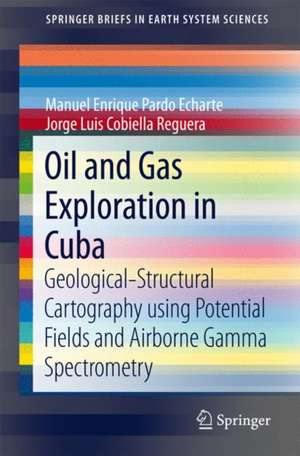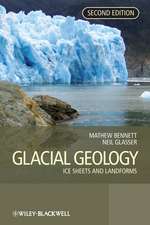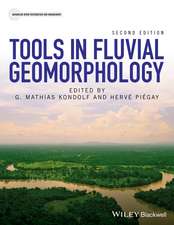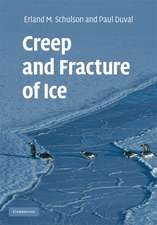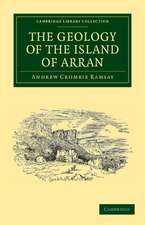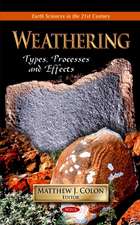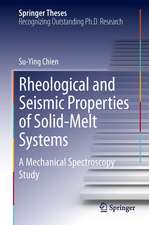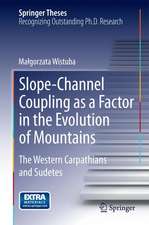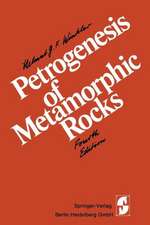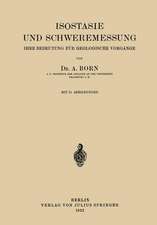Oil and Gas Exploration in Cuba: Geological-Structural Cartography using Potential Fields and Airborne Gamma Spectrometry: SpringerBriefs in Earth System Sciences
Autor Manuel Enrique Pardo Echarte, Jorge Luis Cobiella Regueraen Limba Engleză Paperback – 3 mai 2017
In an attempt to contribute to the geological-structural mapping of the metamorphic massif Isla de la Juventud, with emphasis on acid magmatism, the gravi-magnetometric data is used. According to the results, the presumed post metamorphic granitic bodies of low density are located, mainly, in the central and southwestern part of the massif. The granitic bodies apparently were introduced through the system of longitudinal faults (syn metamorphic) and transverse (post metamorphic) at the end of the process multyfolding and metamorphism of the massif sequences, taking a leading role the deep longitudinal fracture zones of sublatitudinal direction in the central and southern part of the massif. On the map of the magnetic field vertical derivative the anomalies, basically, reflected the direction and limits of the folded tectonic structure, the development area of volcanogenic rocks, the presumed development zones of migmatitic rocks and tectonised rocks in North and center of the massif, respectively, and the prevailing direction of the main tectonic dislocations.
Din seria SpringerBriefs in Earth System Sciences
-
 Preț: 379.09 lei
Preț: 379.09 lei -
 Preț: 260.95 lei
Preț: 260.95 lei -
 Preț: 378.54 lei
Preț: 378.54 lei -
 Preț: 380.07 lei
Preț: 380.07 lei -
 Preț: 376.22 lei
Preț: 376.22 lei -
 Preț: 377.57 lei
Preț: 377.57 lei -
 Preț: 379.48 lei
Preț: 379.48 lei -
 Preț: 379.09 lei
Preț: 379.09 lei -
 Preț: 377.35 lei
Preț: 377.35 lei -
 Preț: 379.09 lei
Preț: 379.09 lei -
 Preț: 259.57 lei
Preț: 259.57 lei -
 Preț: 376.80 lei
Preț: 376.80 lei -
 Preț: 377.73 lei
Preț: 377.73 lei -
 Preț: 379.86 lei
Preț: 379.86 lei -
 Preț: 381.00 lei
Preț: 381.00 lei -
 Preț: 140.77 lei
Preț: 140.77 lei -
 Preț: 380.07 lei
Preț: 380.07 lei -
 Preț: 262.47 lei
Preț: 262.47 lei -
 Preț: 377.18 lei
Preț: 377.18 lei -
 Preț: 260.56 lei
Preț: 260.56 lei -
 Preț: 376.22 lei
Preț: 376.22 lei -
 Preț: 377.18 lei
Preț: 377.18 lei -
 Preț: 348.79 lei
Preț: 348.79 lei -
 Preț: 378.12 lei
Preț: 378.12 lei -
 Preț: 379.09 lei
Preț: 379.09 lei -
 Preț: 376.59 lei
Preț: 376.59 lei -
 Preț: 375.23 lei
Preț: 375.23 lei -
 Preț: 376.04 lei
Preț: 376.04 lei -
 Preț: 380.07 lei
Preț: 380.07 lei -
 Preț: 443.58 lei
Preț: 443.58 lei -
 Preț: 384.48 lei
Preț: 384.48 lei -
 Preț: 377.95 lei
Preț: 377.95 lei -
 Preț: 376.59 lei
Preț: 376.59 lei -
 Preț: 350.18 lei
Preț: 350.18 lei -
 Preț: 379.68 lei
Preț: 379.68 lei -
 Preț: 378.71 lei
Preț: 378.71 lei -
 Preț: 378.12 lei
Preț: 378.12 lei -
 Preț: 376.96 lei
Preț: 376.96 lei -
 Preț: 377.35 lei
Preț: 377.35 lei -
 Preț: 374.30 lei
Preț: 374.30 lei -
 Preț: 377.73 lei
Preț: 377.73 lei -
 Preț: 378.34 lei
Preț: 378.34 lei -
 Preț: 378.54 lei
Preț: 378.54 lei -
 Preț: 412.89 lei
Preț: 412.89 lei -
 Preț: 375.62 lei
Preț: 375.62 lei -
 Preț: 341.97 lei
Preț: 341.97 lei -
 Preț: 379.09 lei
Preț: 379.09 lei -
 Preț: 375.23 lei
Preț: 375.23 lei -
 Preț: 377.35 lei
Preț: 377.35 lei
Preț: 424.71 lei
Nou
Puncte Express: 637
Preț estimativ în valută:
81.27€ • 85.08$ • 67.24£
81.27€ • 85.08$ • 67.24£
Carte disponibilă
Livrare economică 15-29 martie
Preluare comenzi: 021 569.72.76
Specificații
ISBN-13: 9783319567433
ISBN-10: 3319567438
Pagini: 76
Ilustrații: XIV, 76 p. 48 illus., 45 illus. in color.
Dimensiuni: 155 x 235 mm
Greutate: 1.28 kg
Ediția:1st ed. 2017
Editura: Springer International Publishing
Colecția Springer
Seria SpringerBriefs in Earth System Sciences
Locul publicării:Cham, Switzerland
ISBN-10: 3319567438
Pagini: 76
Ilustrații: XIV, 76 p. 48 illus., 45 illus. in color.
Dimensiuni: 155 x 235 mm
Greutate: 1.28 kg
Ediția:1st ed. 2017
Editura: Springer International Publishing
Colecția Springer
Seria SpringerBriefs in Earth System Sciences
Locul publicării:Cham, Switzerland
Cuprins
Foreword.- Abstract.- Chapter 1. The State of Art.- Chapter 2. Overview of the Geology of Cuba.- Chapter 3. Tectonic-Structural Regionalization With Purposes of Hydrocarbon Exploration and Mapping of Potential New Oil-gas Goals.- Chapter 4. Geological-structural mapping of weathered igneous and metamorphic rock units.
Textul de pe ultima copertă
A summary of the results achieved in the geological-structural mapping, by potential fields and airborne gamma spectrometry data, of the units of igneous and metamorphic rocks in the western regions (Havana-Matanzas), central (Cienfuegos, Villa Clara-Sancti Spiritus) and central-eastern (Camagüey-Las Tunas-Holguín) of Cuba is presented. In addition, the structural- tectonic regionalization with hydrocarbon exploration purposes, focusing mapping of possible new oil-gas targets in the regions of Land Blocks 9, 23 and 17-18 are detailed in this volume. In certain case study locations (Majaguillar, North Motembo, Guamutas and Maniabón) reconnaissance work by a profile of Redox Complex (complex of unconventional geophysical-geochemical exploration techniques) was performed with positive results.
In an attempt to contribute to the geological-structural mapping of the metamorphic massif Isla de la Juventud, with emphasis on acid magmatism, the gravi-magnetometric datais used. According to the results, the presumed post metamorphic granitic bodies of low density are located, mainly, in the central and southwestern part of the massif. The granitic bodies apparently were introduced through the system of longitudinal faults (syn metamorphic) and transverse (post metamorphic) at the end of the process multyfolding and metamorphism of the massif sequences, taking a leading role the deep longitudinal fracture zones of sublatitudinal direction in the central and southern part of the massif. On the map of the magnetic field vertical derivative the anomalies, basically, reflected the direction and limits of the folded tectonic structure, the development area of volcanogenic rocks, the presumed development zones of migmatitic rocks and tectonised rocks in North and center of the massif, respectively, and the prevailing direction of the main tectonic dislocations.
In an attempt to contribute to the geological-structural mapping of the metamorphic massif Isla de la Juventud, with emphasis on acid magmatism, the gravi-magnetometric datais used. According to the results, the presumed post metamorphic granitic bodies of low density are located, mainly, in the central and southwestern part of the massif. The granitic bodies apparently were introduced through the system of longitudinal faults (syn metamorphic) and transverse (post metamorphic) at the end of the process multyfolding and metamorphism of the massif sequences, taking a leading role the deep longitudinal fracture zones of sublatitudinal direction in the central and southern part of the massif. On the map of the magnetic field vertical derivative the anomalies, basically, reflected the direction and limits of the folded tectonic structure, the development area of volcanogenic rocks, the presumed development zones of migmatitic rocks and tectonised rocks in North and center of the massif, respectively, and the prevailing direction of the main tectonic dislocations.
Caracteristici
Examines oil and gas exploration in Cuba Presents a unique approach to geological-structural mapping for exploration Discusses geophysical-geochemical exploration techniques in relation to oil and gas Includes supplementary material: sn.pub/extras
